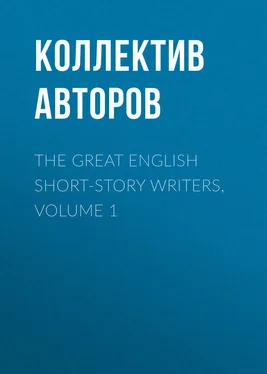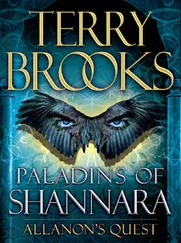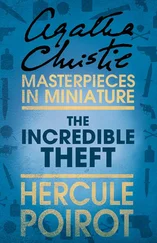Коллектив авторов - The Great English Short-Story Writers, Volume 1
Здесь есть возможность читать онлайн «Коллектив авторов - The Great English Short-Story Writers, Volume 1» — ознакомительный отрывок электронной книги совершенно бесплатно, а после прочтения отрывка купить полную версию. В некоторых случаях можно слушать аудио, скачать через торрент в формате fb2 и присутствует краткое содержание. Жанр: foreign_antique, foreign_prose, на английском языке. Описание произведения, (предисловие) а так же отзывы посетителей доступны на портале библиотеки ЛибКат.
- Название:The Great English Short-Story Writers, Volume 1
- Автор:
- Жанр:
- Год:неизвестен
- ISBN:нет данных
- Рейтинг книги:3 / 5. Голосов: 1
-
Избранное:Добавить в избранное
- Отзывы:
-
Ваша оценка:
- 60
- 1
- 2
- 3
- 4
- 5
The Great English Short-Story Writers, Volume 1: краткое содержание, описание и аннотация
Предлагаем к чтению аннотацию, описание, краткое содержание или предисловие (зависит от того, что написал сам автор книги «The Great English Short-Story Writers, Volume 1»). Если вы не нашли необходимую информацию о книге — напишите в комментариях, мы постараемся отыскать её.
The Great English Short-Story Writers, Volume 1 — читать онлайн ознакомительный отрывок
Ниже представлен текст книги, разбитый по страницам. Система сохранения места последней прочитанной страницы, позволяет с удобством читать онлайн бесплатно книгу «The Great English Short-Story Writers, Volume 1», без необходимости каждый раз заново искать на чём Вы остановились. Поставьте закладку, и сможете в любой момент перейти на страницу, на которой закончили чтение.
Интервал:
Закладка:
"Look to her, Moor; have a quick eye to see; She has deceived her father, and may thee ." 5 5 Othello , act I, scene III.
But the ethical treatment of the short-story, as exemplified in these monkish fables, handicapped its progress and circumscribed its field of endeavor. Morality necessitated the twisting of incidents, so that they might harmonize with the sermonic summing-up that was in view. Life is not always moral; it is more often perplexing, boisterous, unjust, and flippant. The wicked dwell in prosperity. "There are no pangs in their death; their strength is firm. They are not in trouble as other men; neither are they plagued as other men. They have more than heart could wish." But the art of the teller of tales "is occupied, and bound to be occupied not so much in making stories true as in making them typical." 6 6 From a Humble Remonstrance, in Memories and Portraits , by R.L. Stevenson.
The ethical method of handling fiction falls between two stools; it not only fails in portraying that which is true for the individual, but it incurs the graver error of ceasing to be true to the race, i.e., typical.
It would be interesting, had we space, to follow Shakespeare in his borrowings, noticing what he adopts and incorporates in his work as artistically true, and what he rejects. Like a water-color landscape-painter, he pauses above the box of crude materials which others have made, takes a dab here and a dab there with his brush, rarely takes all of one color, blends them, eyes the result judicially, and flashes in the combination with swiftness and certainty of touch.
For instance, from the lengthy story which appears as the hundred and first tale in Mr. Douce's edition of the Gesta , he selects but one scene of action, yet it is the making of Macbeth – one would almost suppose that this was the germ-thought which kindled his furious fancy, preceding his discovery of the Macbeth tradition as related in Holinshed's Chronicle . 7 7 The Chronicle of England and Scotland , first published in 1577.
The Emperor Manelay has set forth to the Holy Land, leaving his empress and kingdom in his brother's care. No sooner has he gone than the regent commences to make love to his brother's wife. She rejects him scornfully. Angered by her indignation, he leads her into a forest and hangs her by the hair upon a tree, leaving her there to starve. As good-fortune will have it, on the third day a noble earl comes by, and, finding her in that condition, releases her, takes her home with him, and makes her governess to his only daughter. A feeling of shame causes her to conceal her noble rank, and so it comes about that the earl's steward aspires to her affection. Her steadfast refusal of all his advances turns his love to hatred, so that he plans to bring about her downfall. Then comes the passage which Shakespeare seized upon as vital: "It befell upon a night that the earl's chamber door was forgotten and left unshut, which the steward had anon perceived; and when they were all asleep he went and espied the light of the lamp where the empress and the young maid lay together, and with that he drew out his knife and cut the throat of the earl's daughter and put the knife into the empress's hand, she being asleep, and nothing knowing thereof, to the intent that when the earl awakened he should think that she had cut his daughter's throat, and so would she be put to a shameful death for his mischievous deed."
The laws of immediateness and concentration, which govern the short-story, are common also to the drama; by reason of their brevity both demand a directness of approach which leads up, without break of sequence or any waste of words, through a dependent series of actions to a climax which is final. It will usually be found in studying the borrowings which the masters have made from such sources as the Gesta Romanorum that the portions which they have discriminated as worth taking from any one tale have been the only artistically essential elements which the narrative contains; the remainder, which they have rejected, is either untrue to art or unnecessary to the plot's development.
These tales, as told by their monkish compiler, lack "that harmony of values and brilliant unity of interest that results when art comes in" – they are splendid jewels badly cut.
V
As has been already stated, a short-story theme, however fine, can only be converted into good art by the suppression of whatever is discursive or ungainly, so that it becomes integral and balanced in all its parts; and by the addition of a stroke of fantasy, so that it becomes vast, despite its brevity, implying a wider horizon than it actually describes; but, in excess of these qualities, there is a last of still greater importance, without which it fails — the power to create the impression of having been possible .
Now the beast-fable, as handled by Aesop, falls short of being high art by reason of its overwhelming fantasy, which annihilates all chance of its possibility. The best short-stories represent a struggle between fantasy and fact. And the mediaeval monkish tale fails by reason of the discursiveness and huddling together of incidents, without regard to their dramatic values, which the moral application necessitates. In a word, both are deficient in technique – the concealed art which, when it has combined its materials so that they may accomplish their most impressive effect, causes the total result to command our credulity because it seems typical of human experience.
The technique of the English prose short-story had a tardy evolution. That there were any definite laws, such as obtain in poetry, by which it must abide was not generally realized until Edgar Allan Poe formulated them in his criticism of Nathaniel Hawthorne.
As he states them, they are five in number, as follows: Firstly, that the short-story must be short, i.e., capable of being read at one sitting, in order that it may gain "the immense force derivable from totality ." Secondly, that the short-story must possess immediateness ; it should aim at a single or unique effect – "if the very initial sentence tend not to the outbringing of this effect, then it has failed in its first step." Thirdly, that the short-story must be subjected to compression ; "in the whole composition there should not be one word written of which the tendency, direct or indirect, is not to the one pre-established design." Fourthly, that it must assume the aspect of verisimilitude ; "truth is often, and in very great degree, the aim of the tale – some of the finest tales are tales of ratiocination." Fifthly, that it must give the impression of finality ; the story, and the interest in the characters which it introduces, must begin with the opening sentence and end with the last.
These laws, and the technique which they formulate, were first discovered and worked out for the short-story in the medium of poetry. 8 8 Poe himself implies this when he says, in an earlier passage of his essay on Hawthorne: "The Tale Proper" (i.e., short-story), "in my opinion, affords unquestionably the fairest field for the exercise of the loftiest talent which can be afforded by the wide domains of mere prose. Were I bidden to say how the highest genius could be most advantageously employed for the best display of its own powers, I should answer, without hesitation, in the composition of a rhymed poem, not to exceed in length what might be perused in an hour. Within this limit alone can the highest order of true poetry exist. I need only here say, upon this topic, that in almost all classes of composition the unity of effect or impression is a point of the greatest importance. It is clear , moreover, that this unity cannot be thoroughly preserved in productions whose perusal cannot be completed at one sitting ."
The ballad and narrative poem must be, by reason of their highly artificial form, comparatively short, possessing totality, immediateness, compression, verisimilitude, and finality. The old ballad which commemorates the battle of Otterbourne, fought on August 10, 1388, is a fine example of the short-story method. Its opening stanza speaks the last word in immediateness of narration:
Интервал:
Закладка:
Похожие книги на «The Great English Short-Story Writers, Volume 1»
Представляем Вашему вниманию похожие книги на «The Great English Short-Story Writers, Volume 1» списком для выбора. Мы отобрали схожую по названию и смыслу литературу в надежде предоставить читателям больше вариантов отыскать новые, интересные, ещё непрочитанные произведения.
Обсуждение, отзывы о книге «The Great English Short-Story Writers, Volume 1» и просто собственные мнения читателей. Оставьте ваши комментарии, напишите, что Вы думаете о произведении, его смысле или главных героях. Укажите что конкретно понравилось, а что нет, и почему Вы так считаете.












